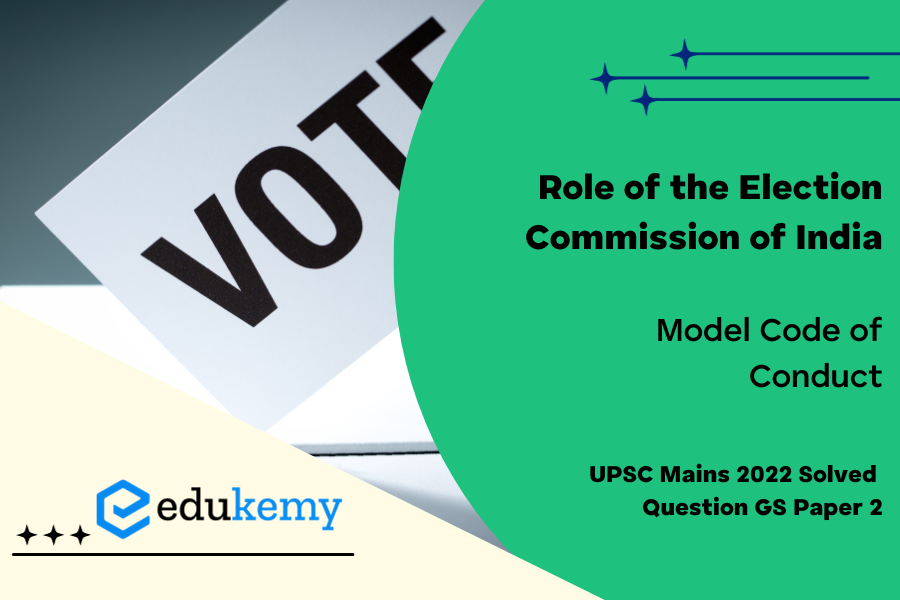The Election Commission of India plays a pivotal role in ensuring fair elections, evolving the Model Code of Conduct (MCC) over time. The MCC serves as a moral compass, guiding political behavior during elections, fostering transparency, and maintaining the integrity of the democratic process, enhancing the Commission’s significance.
UPSC Mains General Studies Paper – 2 Mains 2022
UPSC Mains Civil Services IAS Exam Question Paper – 2022
Contents
Approach
- Start with a brief intro of the key word “election commission and model code of conduct”.
- Discuss the Role of the Election Commission of India.
- Explain the evolution of the Model Code of Conduct by the election commission of India.
- Conclusion/way forward.
Answer
Introduction
- The Election Commission ensures its observance by political party(is) in power, including ruling parties at the Centre and in the States and contesting candidates in the discharge of its constitutional duties for conducting the free, fair and peaceful elections to the Parliament and the State Legislatures under Article 324 of the Constitution of India. The Model Code of Conduct for guidance of political parties and candidates is a set of norms which has been evolved with the consensus of political parties who have consented to abide by the principles embodied in the said code and also binds them to respect and observe it in its letter and spirit.
Body
- Election Commission of India is to ensure free and fair elections as per the norms and the Model Code of Conduct. It is in charge of monitoring the actions and activities of the political parties and candidates and trying to ensure free, fair and transparent elections in India.

Role of the Election Commission of India: Its primary role is to ensure that elections are conducted in a transparent, impartial, and credible manner. Some of the key roles and responsibilities of the Election Commission of India are:
- Conducting elections: The ECI conducts elections for the Lok Sabha, Rajya Sabha, State Legislative Assemblies, and other local bodies such as Panchayats and Municipalities. It ensures that the elections are conducted in a fair and transparent manner.
- Voter registration: The ECI is responsible for maintaining the voter list, which includes the names of all eligible voters in the country. It ensures that all eligible voters are registered and that there are no duplicate or fraudulent entries.
- Monitoring political parties: The ECI monitors the activities of political parties and ensures that they comply with the rules and regulations set out in the Model Code of Conduct. It takes action against parties that violate the code.
- Enforcement of election laws: The ECI enforces election laws and takes action against those who violate them. It has the power to disqualify candidates who engage in corrupt practices or use illegal means to influence voters.
- Conducting by-elections: The ECI is responsible for conducting by-elections in case of vacancies in the Lok Sabha, Rajya Sabha, or State Legislative Assemblies.
- Educating voters: The ECI conducts awareness campaigns to educate voters about the importance of voting and how to cast their vote.
- Monitoring election expenses: The ECI monitors the election expenses of candidates and political parties and ensures that they do not exceed the legal limit.
The evolution of the Model Code of Conduct by the election commission of India: The Model Code of Conduct (MCC) is a set of guidelines issued by the Election Commission of India (ECI) for political parties and candidates to follow during elections. It was first introduced in 1960 for the state elections and later extended to cover all elections. The MCC has evolved to include several new provisions and guidelines to ensure free and fair elections. Some of the major milestones in the evolution of the MCC are:
- 1960 MCC: The MCC was introduced for the first time for state elections, and it mainly dealt with maintaining the decency of political campaigning.
- 1979 MCC: The MCC was revised to cover the use of official machinery during elections, and it prohibited the use of government resources for political campaigns.
- 1991 MCC: The MCC was further revised to cover issues such as the use of loudspeakers, processions, and meetings. It also prohibited appeals to caste or communal feelings.
- 2013 MCC: The MCC was revised to include social media platforms as a tool for political campaigning. The ECI issued guidelines on the use of social media platforms, and it became mandatory for candidates to disclose their social media accounts.
- 2019 MCC: The MCC was revised to include guidelines on the use of digital platforms for political advertising. It mandated that all digital political advertising should be pre-certified by the ECI.
Overall, the evolution of the MCC has been aimed at ensuring a level playing field for all political parties and candidates during elections. It has become an important tool to ensure free and fair elections and has played a crucial role in strengthening India’s democratic process.
Conclusion
- Thus, we can say the role of the Election Commission of India in the evolution of the Model Code of Conduct has been crucial in ensuring free, fair, and transparent elections in India. The MCC has undergone several revisions over the years to address new challenges, and the ECI has taken several measures to ensure that it is followed strictly by all political parties and candidates. The ECI’s efforts to keep up with the changing times and to address new challenges have been critical in maintaining the integrity of the electoral process in India.
In case you still have your doubts, contact us on 8792740517.
For UPSC Prelims Resources, Click here
For Daily Updates and Study Material:
Join our Telegram Channel – Edukemy for IAS
- 1. Learn through Videos – here
- 2. Be Exam Ready by Practicing Daily MCQs – here
- 3. Daily Newsletter – Get all your Current Affairs Covered – here
- 4. Mains Answer Writing Practice – here


